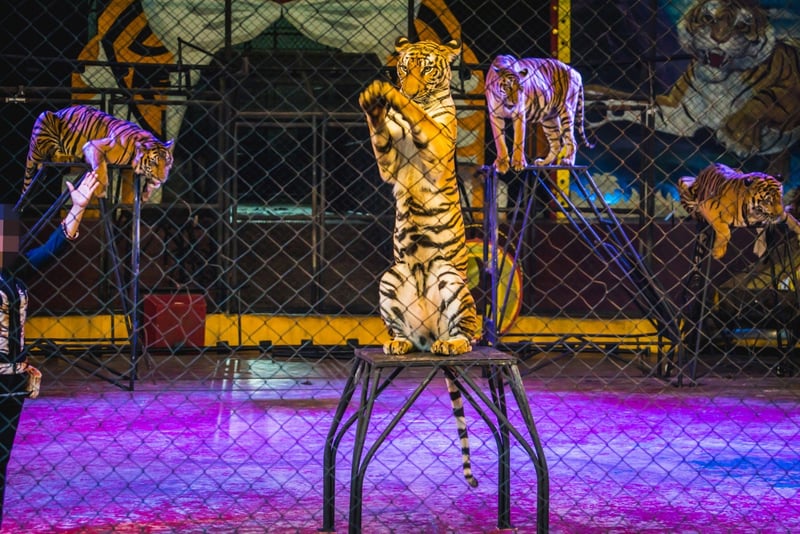
World Animal Protection urges UNWTO to call for phase-out of captive wildlife entertainment
Press release
In an open letter, World Animal Protection supported by other NGOs including Humane Society International, Born Free, and Animal Welfare Institute call on the UNWTO and its partners to lead the way in making sure the travel industry comes back stronger for wildlife, as it prepares for recovery.
Last month, the United Nations World Tourism Organization (UNWTO) released a set of 23 recommendations for the global tourism industry, focused on ’growing back better’ as the sector recovers, post COVID-19.
In an open letter, World Animal Protection supported by other NGOs including Humane Society International, Born Free, and Animal Welfare Institute call on the UNWTO and its partners to lead the way in making sure the travel industry comes back stronger for wildlife, as it prepares for recovery. The call on the UNWTO is also backed by travel companies such as Airbnb, Intrepid Travel and travel associations, including SATSA in South Africa.
Transition to wildlife-friendly tourism is not featured in the UNWTO's recommendations. COVID-19 is a wakeup call for the world to reset its relationship with wild animals – and the case to completely phase out all captive wildlife entertainment has never been more urgent.
The cruel exploitation of wild animals’ fuels disease emergence, and the ongoing pandemic is a prime example of that – the unnecessary close contact between humans and wildlife especially where captive animals are subjected to poor welfare condition can have catastrophic and devastating effects.
Millions of animal lovers every year are fooled into thinking that shows with wild animals, and experiences often sold by some of the world’s largest travel companies are cruelty-free, educational and good for conservation efforts. But this could not be further from the truth.
Wildlife tourist attractions account for 20-40% of international tourism globally. The growth of global tourism has driven the trade of hundreds of thousands of wild animals to be used for entertainment where they suffer in inhumane captive conditions, are used as props for cruel wildlife selfies and can be beaten, chained and abused.
Up to 550,000 wild animals are estimated to be trapped in cruel tourist venues across the world[1]. The multi-billion-dollar trade in wild animals takes animals from their natural environments or commercially farms them, exposing them to stress and cruelty creating a potential hotbed for disease.
For the tourism industry to come back stronger for wildlife, UNWTO needs to call for protecting all wild animals from cruel tourist entertainment. This requires a commitment from the sector to stop profiting from activities such as elephant rides and shows, selfies with wild animals, petting big cats and swimming with captive dolphins, and to only sell and promote wildlife-friendly tourism – including genuine wildlife sanctuaries and well-managed observation of wild animals in their natural habitat.
This will:
- Minimize the risk of future pandemics
- Help protect / safeguard the health of tourists and tourism workers
- Help protect / safeguard all wildlife species from exploitation in entertainment
- Harness tourism’s full potential to be a responsible economic rationale for protecting wildlife in the wild
- Strengthen the image of the tourism sector as a force for good not cruelty
Nick Stewart, Global Head of Wildlife at World Animal Protection says:
"It’s not acceptable for the travel industry to go back to the same way of doing business. It has to build back better for wildlife. UNWTO has a significant role to play in leading the way on this.
"Demand for captive wildlife in tourism entertainment attractions drives captive breeding for the wildlife trade and the removal of wild animals from their natural habitats. Responsible wildlife-friendly tourism is safer and helps put an end to the horrific trade in wild animals for entertainment."
"We are at a turning point in our relationship with wild animals. We need to start practicing social / physical distancing between people and wildlife - leaving wild animals in the wild, where they belong."
World Animal Protection strongly recommends that the UNWTO calls for the phasing out of all use of captive wildlife for tourist entertainment. In doing so, the UNWTO has the unique opportunity to address the suffering and exploitation of wild animals, help safeguard human health as well promote the recovery of a responsible and resilient tourism economy.
-END-
Notes to editors
- For an interview with a spokesperson contact: Kirsty Warren, Global Media Manager on +44 (0) 7809 269 747 or kirstywarren@worldanimalprotection.org
- Read the letter written to the United Nations World Tourism Organization (UNWTO) <LINK>
- World Animal Protection has launched a campaign to demand world leaders end the global wildlife trade. Forever. Since launching two weeks ago, we have so far reached more than 100,000 petition signatures. Find out more here.
- Wildlife entertainment includes activities that risk portraying or trivialising wild animals as pets, novelty objects, comedians, or domesticated species; that encourage animals to perform behaviours that are either unnatural, unnecessary, or harmful; that involve procedures that may be considered stressful or harmful to all or individual animals; that expose visitors or handlers to unnecessary risks of injury or disease; that are commerce-driven beyond sustaining maintenance of the animals at facilities striving to phase-out captive wild animal keeping; or that may risk replication of similar activities in harmful ways in other places.